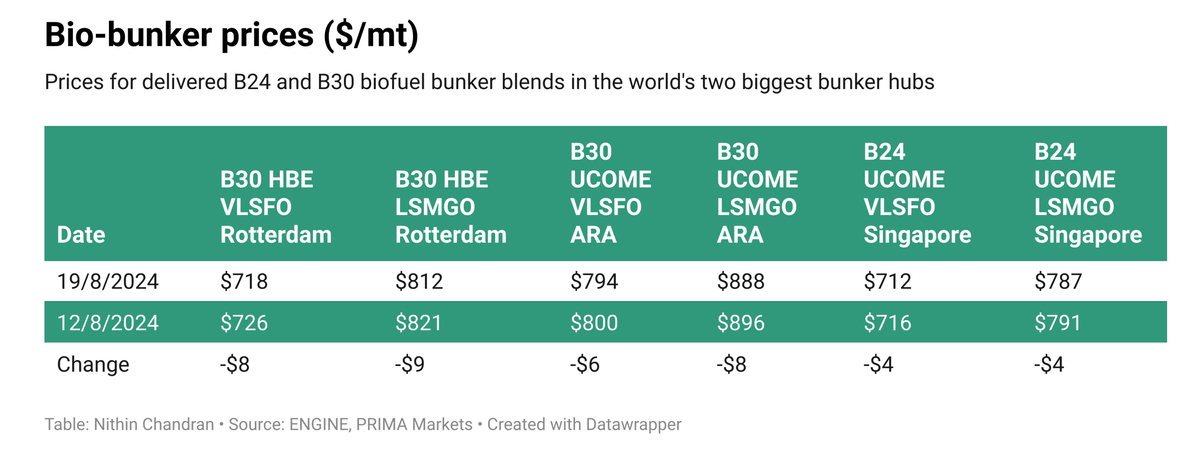Biofuel Bunker Snapshot: China may ramp up domestic biofuel supply as EU tariffs hit hard
Bio-bunker prices in Singapore and Rotterdam decline
Singapore’s July biofuel sales were up by 2%

Singapore
Singapore’s B24-VLSFO and B24-LSMGO UCOME prices have come down slightly in the past week, both declining by $4/mt. PRIMA assessed the UCOME FOB China benchmark at $970/mt on Friday, down by $10/mt on the week. This has added downward pressure on UCOME-based biofuel prices in Singapore as China is a key exporter of finished biofuel and bio feedstock.
More Chinese UCOME are expected to flow into Singapore as the EU tariffs on Chinese biodiesel imports came into force on 16 August, Will Wong, business development manager at Liaoning Tongde Environmental Protection Technology told ENGINE.
He also expects the Chinese government to take swift measures to promote biofuel bunkering in the country. “I anticipate that there will be mandatory [biofuel blending] measures and incentive policies in the future," Wong said. Liaoning Tongde Environmental Protection Technology is a Chinese marine biofuel producer.
Wong added that “Chinese biodiesel enterprise face unprecedented challenges, and it’s time to make some changes for survival”.
Currently, B24 blends sold in China are not VAT exempted, like VLSFO. This has restricted domestic B24 sales to ocean-going vessels.
Singapore’s biofuel price premiums over pure conventional fuels are $117/mt for the B24-VLSFO blend and $93/mt for the B24-LSMGO. These premiums have remained largely steady in the past week. Suppliers in Singapore sold about 49,000 mt of bio-blended bunkers in July, up from 48,000 mt sold in June.
Rotterdam
Rotterdam’s B30-VLSFO HBE and B30-LSMGO HBE prices have declined by $8–9/mt in the past week. The two benchmarks have declined despite the Palm Oil Mill Effluent Methyl Ester (POMEME) benchmark holding steady in the past week in the ARA. PRIMA assessed the POMEME price in the ARA at $1,331/mt on Friday, unchanged on the week.
POMEME-based biofuels are popular in the Dutch ports as they qualify for advanced biofuel rebates through the Dutch HBE system. The ongoing EU anti-dumping investigations on Chinese biodiesel imports may force European buyers to import POMEME from other countries.
POME is a by-product generated during palm oil production that can be further processed into POMEME by biodiesel refineries.
Faris Razanah Zharfan thinks that Indonesian biodiesel refineries have the potential to process POME into POMEME, but high capex investments required to upgrade these facilities have been holding back these businesses from making these changes. “POME has higher free fatty acids (FFA) and impurities compared to crude palm oil (CPO), so capex to build additional facilities needs to be carefully thought” Zharfan told ENGINE.
Zharfan thinks that some biodiesel refineries in the UAE are capable of converting POME into POMEME. He is the founder of the Indonesian waste-based biofuel firm Beli Jelantah. Indonesia exports a substantial amount of POME to China, which gets processed into POMEME and then re-exported to countries in Europe.
Rotterdam’s B30-VLSFO UCOME and B30-LSMGO UCOME have declined by $6–8/mt in the past week amid a $26/mt drop in the PRIMA Markets’ underlying UCOME FOB ARA benchmark. Rotterdam’s B30-VLSFO UCOME is priced about $76/mt higher than Rotterdam’s B30-VLSFO HBE as UCOME-blends don’t qualify for Dutch rebates.
By Nithin Chandran
Please get in touch with comments or additional info to news@engine.online






